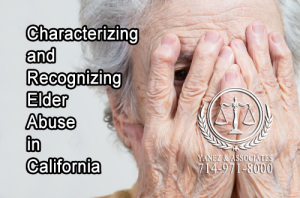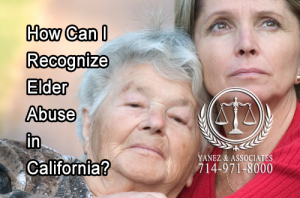FAQ: What is Elder Abuse in California?
What is Elder Abuse in California? - Elder abuse in California can be either civil or criminal. When abuse against an elder person takes place, specific laws, either civil or criminal, determine the consequences.
An elder person is someone who is 65 years old or older.
Criminal abuse takes place when a person either intentionally causes or allows an elder person to suffer physical or mental pain or suffering, or allows or places the elder person in a situation where his or her health or safety is in danger.
Civil elder abuse is slightly different, and it includes several types of abuse, including physical abuse, financial abuse, neglect, isolation or abandonment, abduction or other actions that result in physical or mental pain, harm or suffering. Civil elder abuse can also include allowing an elder person to be in a situation to that would cause physical or mental harm or suffering.
Characterizing and Recognizing Elder Abuse in California

Learn about Characterizing and Recognizing Elder Abuse in California
Physical Abuse - Inflicting physical pain, physical injuries, as well as sexual assault, molestation, or using chemical restraints unnecessarily can constitute physical abuse in California. Physical signs of physical abuse can include the following.
• Weight loss that cannot be medically explained, including signs of malnutrition or dehydration;
• Physical injuries, especially those that do not match the stories that explain them. Injuries can include bruises, fractures, broken bones, scrapes, and more;
• Obvious skin damage also includes things like bruises, especially those that may be hidden in places that may not be obvious like the inner arm, inner thigh, or underneath clothes.
• It is also important to watch out for new injuries and bruises in the same areas. This can be an indication of repeating injuries caused by repeated abuse, especially when different injuries are at various stages of healing.
• Injuries in clusters, injuries on softer parts of the body, or repeated injuries in one area are all signs of abuse;
• Look out for injuries of all kinds, like scratches, scrapes, pinch marks, signs of choking, bruises, burns, sprains, punctures, bedsores, fractures, welts or gag marks.
Financial Abuse - Financial abuse can be one of the most difficult types of abuse to detect, especially because often times elders are not in charge of their own finances. Financial abuse includes any type of illegal or unethical use of or exploitation of an elder’s financial supply, property, or assets. Financial scams can be one of the biggest causes of abuse, especially with elders in California.
Neglect - When a person is responsible for the care of an elder, if that person fails to care for the elder in any way, their actions can constitute neglect. Failing to provide adequate assistance relating to personal hygiene, food, clothing, shelter, water, or protection all constitute neglect. It also includes failure to protect the person from any health hazard, safety hazard, or malnutrition.
Abandonment - A caregiver who deserts an elder for whom they are responsible can also be found guilty of abuse through abandonment.
Isolation - Any person who intentionally isolates an elder can also be found guilty of abuse. Isolation includes preventing an elder person from spending time with, or corresponding with friends, family, doctors, caregivers, or other people either over the phone, through the mail, over the internet, or in person.
Mental Suffering - Inflicting mental pain or suffering or allowing a person to suffer mentally either through fear, threats, confusion, harassment, agitation, or isolation can also constitute abuse under the elder abuse law in California.
How Can I Recognize Elder Abuse in California?
In some cases, physical signs of abuse are not enough. Abusers and victims can both be skilled at hiding the signs, especially because physical signs can be the easiest to spot. So, if you can’t see physical signs of abuse, how are you supposed to spot and stop it from occurring?
Look for behavioral signs of elder abuse. Certain actions can be tells that either an abuser or a victim can show that they may not even be aware of. Look for unusual agitation, anger, defensiveness, denial, silence, refusal to answer questions either in the presence or not in the presence of a specific person, a hesitation to speak freely, anxiety, stories that do not make sense, confusion, disorientation, fear, withdraw, depression, or helplessness.
What are the Penalties for Elder Abuse?
The penalties for elder abuse in California depend on whether the abuse was considered civil or criminal. Usually the penalty for civil abuse is only intended to correct a wrong that was done, while the penalty for criminal elder abuse is intended to punish a person for breaking the law. However, it is not uncommon for a person to face both civil and criminal charges for a crime.
Depending on the extent of the elder abuse, the criminal punishments for elder abuse can vary from extremely strict to not so strict.
If the abuse results in death of an elder, the offender can face punishment up to death, life without the possibility of parole, or 25 years to life in prison.
Rape is considered the next most serious type of abuse, and can lead to up to eight years in prison.
Lewd or lascivious acts, including forceful or violent acts against a person are considered a felony, and can lead to up to 10 years in prison and up to a $10,000 fine.
A less serious crime will not cause or permit great bodily harm or death, but still may cause or permit physical or mental pain and suffering. Specifics of the crime can vary, but a misdemeanor will carry a less severe punishment.
It is always important to report elder abuse when you are aware that it is taking place. Those who fail to report cases of suspected abuse, whether it is physical abuse, abandonment, abduction, isolation, financial abuse, neglect, or another type of elder abuse can face up to six months in county jail, a $1,000 fine, and a misdemeanor charge. In some cases, the charge can be a felony if the abuse that was not reported leads to great bodily injury or death. In these cases, the person who failed to report the abuse can face up to one year in county jail and a $5,000 fine.
Elder Abuse Lawyer in Orange County
To summarize: If you are asking yourself, What is Elder Abuse? It is important to research the matter in detail. The matter can be researched online, by inquiring with others, or reading books about elder abuse. Elder abuse is any form of maltreatment that the senior experiences ranging from physical, emotional, neglect, or financial abuse. Often times the seniors may not report the abuse. Due to the elderly individuals vulnerable state, it is important to check in with the senior to monitor any unusual behavior.
Detecting elder abuse is difficult due to the seniors fearing any potential repercussions. In addition, they are often unaware of the multitude of resources available to them. It is important for seniors to be aware of all the resources at their disposal.
It is important for others to check in on the elderly daily, or even weekly. Their are various methods of checking in with seniors such as phone calls, or physically going to where they reside to see how they are doing. If you visit a senior living facility you will be able to observe the dynamics between the staff and the elderly individuals. Moreover, you will be able to monitor and observe whether the staff is attentive to the needs of their patients. For example, are the elderly being changed on a frequent basis, are they being fed properly, and are all of their basic needs being met.
If you are ready to pursue your elder law matter further please call today for a free initial consultation. For further information regarding Elder abuse in Orange County please contact your local elder law attorneys. Please call Yanez & Associates at 714-971-8000 for your free initial consultation. We look forward to assisting you and answering any questions you may have.
















